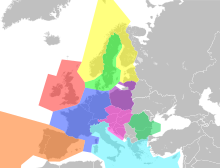This article needs to be updated. (July 2013) |
Functional airspace block (FAB) is defined in the SES-2 legislative package, as follows:

A FAB means an airspace block based on operational requirements and established regardless of State boundaries, where the provision of air navigation services and related functions are performance-driven and optimized with a view to introducing, in each functional airspace block, enhanced cooperation among air navigation service providers or, where appropriate, an integrated provider.
In the context of the Single European Sky (SES) regulations of the European Union and in particular in accordance with Article 8 of the Framework Regulation, the European Commission has issued a mandate to the Eurocontrol Agency for support in the establishment of Functional Airspace Blocks (FABs).
The SES-II regulation requires all EU members to be part of a FAB by 2012. All nine FABs have been declared, established and notified to the European Commission:[1]
- UK-IRELAND FAB: United Kingdom, Ireland
- Danish-Swedish FAB Archived 2 February 2014 at the Wayback Machine: Denmark, Sweden
- BALTIC FAB: Poland, Lithuania
- BLUE MED: Italy, Malta, Greece, Cyprus, (Egypt, Tunisia, Albania, Jordan as observers)
- FABCE (FAB Central Europe): Czech Republic, Slovak Republic, Austria, Hungary, Croatia, Slovenia, Bosnia and Herzegovina
- FABEC (FAB Europe Central): France, Germany, Belgium, Netherlands, Luxembourg, and Switzerland
- DANUBE: Bulgaria, Romania
- NEFAB (North European FAB): Estonia, Finland, Latvia, Norway
- SW FAB (South-West FAB): Portugal (Lisbon FIR), Spain
In 2017 the European Court of Auditors determined that the functional airspace blocks have failed to defragment European airspace as they have not been fully implemented, with aircraft still being serviced by a different air navigation provider in each member state with different rules and requirements. This was due to a "lack of commitment on the part of the member states".[2]
References
edit- ^ "Functional airspace blocks (FABs) – Transport". European Commission. Retrieved 29 December 2017.
- ^ Caterina Tani (1 December 2017). "Auditors: 'Single European Sky' failed to meet main objectives". EUobserver. Retrieved 19 October 2020.
External links
edit- European Commission Guidance Material for the Establishment and Modification of Functional Airspace Blocks (FAB) Archived 27 June 2012 at the Wayback Machine, edition 1.0 of 3 December 2010.